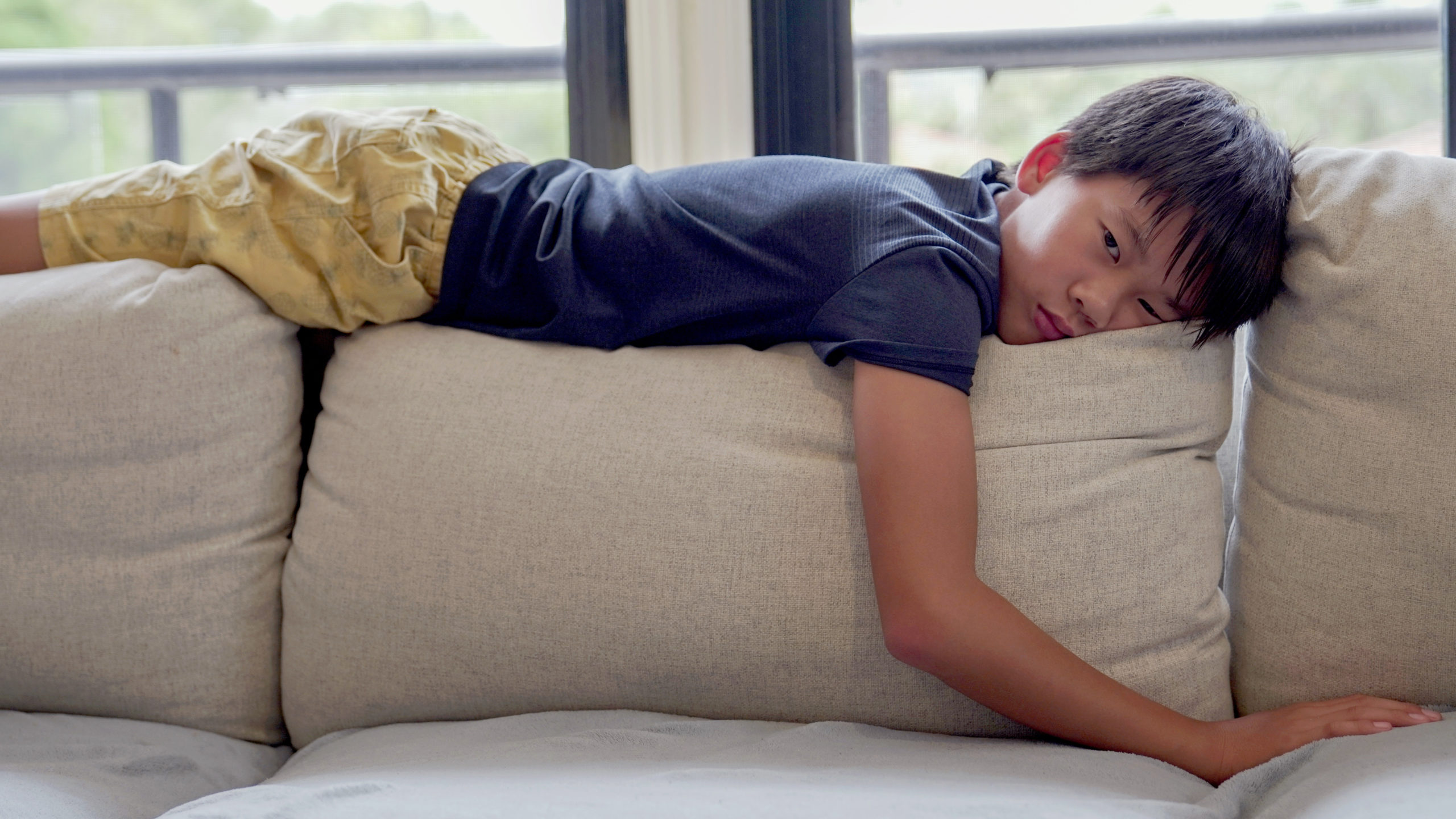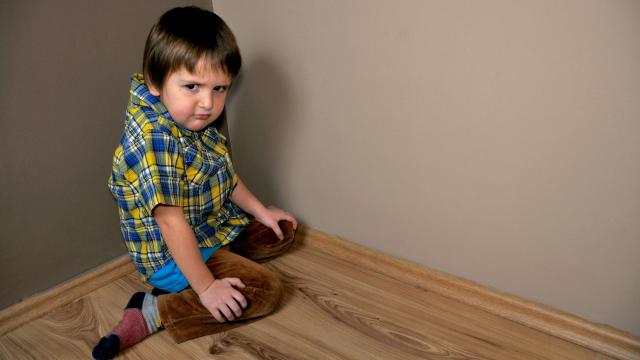Most new parents begin their parenting journey with some idea of how they want to discipline their children. Surely you would never let your three-year-old throw a fit in Target. Your kid won’t talk back to you because, of course, you are going to raise your children to be respectful. But what we don’t realise before we become parents is that kids are natural boundary-testers.
Kids do eventually learn, for the most part, to not throw the All The Fits, to follow the rules, and to speak to others respectfully. They do this not simply because we insist upon it from Day One, but because of the way we discipline them when they make mistakes and break rules along the way.
But how you handle misbehaviour — or promote the behaviours you do want to see — will change depending on their age and developmental stage. So let’s walk through some tips for disciplining your kids, age by age, starting with: babies.
Babies

Ah, this is an easy one to start with! Brand-new babies require exactly zero discipline, no matter how much they scream and cry. You cannot spoil a baby, contrary to the old — and incredibly wrong — way of thinking. You simply can’t hold them too much, or rock them too often, or respond to their cries too quickly. Stanford Health explains:
There is no scientific evidence that responding to crying causes a baby to be clingy. In fact, child development research shows that responding to your baby’s cries has the opposite effect. Warm, in-tune, responsive relationships are what actually help your baby feel emotionally safe and secure. If your baby is met with consistent, predictable and nurturing interactions, your baby will be less whiny and clingy.
However, as they get closer to their first birthday and begin to move about at an ever-increasing pace, you will have to start setting limits for what they can do. What that mostly looks like at this age is using positive language for what you want them to do, versus using negative language for what you don’t want them to do. For example, if they’re trying to stand up in their high chair, you might say, “Oh, let’s sit while we’re eating,” rather than “No, don’t stand up!”
In fact, as hard as it is, try to reserve “no” for the biggest issues, particularly around safety.
Next up: Toddlers and preschoolers.
Toddlers and preschoolers

Toddlers and preschoolers can be little balls of frustration. Hell, you would be, too, if you couldn’t fully process what was happening around you, understand basic universal concepts like time, or didn’t know how to verbalise your every need — all while having control over basically nothing. Spanking and harsh words aren’t only not the right way to go, they also simply don’t work. What little kids (and, really, all kids) need is for you to set limits, give them your attention, model the behaviour you want to see, and — whenever possible — catch them being good.
Little kids want to please you, so they benefit from tons of encouragement and praise when they’re behaving the way you’d like. Dr. Harvey Karp, author of The Happiest Baby on the Block and The Happiest Toddler on the Block, also often advises that parents “gossip” about the good behaviours they’ve seen from their kids with others — and make sure the kids “overhear” it. (Read more on why and how to gossip about them here.)
Redirection away from undesirable behaviours (such as throwing toys) toward another activity is always a good tactic at this age, because little kids often misbehave either out of boredom or because they just don’t know any better. When that happens, it’s often time to find something else for them to do.
Kids this age also need some semblance of control, so offer that to them in the form of simple choices they can make throughout the day. Let them choose between the green shirt or the red shirt, strawberries or a banana, a walk to the park or playtime in the backyard. It makes it a little easier to relinquish control in all the other areas of their lives if they can make some decisions here and there.
All of this is about preventing a tantrum, but even so, they’re still going to throw the occasional (ok, frequent) fit — and we’ve got plenty of tips for managing them when they do happen.
[referenced id=”866416″ url=”https://www.lifehacker.com.au/2018/11/instead-of-a-time-out-try-a-time-in/” thumb=”https://www.gizmodo.com.au/wp-content/uploads/sites/4/2018/11/29/o4tibgdpxdebtmoc3jdn.jpg” title=”Instead Of A Time-Out, Try A Time-In” excerpt=”When my son was a tantrum-y (and somewhat aggressive) toddler/preschooler, we spent a lot of time enforcing the time-honoured tradition of the time-out. Made extra popular by Supernanny Jo Frost, the time-out seemed like a bit of a last result — and honestly not terribly effective — but we found…”]
Now let’s talk about big kids.
Early elementary-aged kids

Now that they’re better able to express their feelings and maintain at least some self-control, these are the years to really lay the foundation for their future behaviour. Finding “natural consequences” for undesirable behaviours, whenever possible, is the best thing you can do. If they run out into the street while you’re walking to school, now they have to hold your hand for the rest of the walk. If they throw a toy, that toy goes away for a set amount of time. If they leave stacks of dirty dishes in their bedroom, they can’t take food in there anymore.
Jane Nelsen, author of the Positive Discipline series, tells Parents.com that a consequence is more likely to teach a helpful lesson when it follows the “Three Rs”: It’s related to the behaviour (as opposed to a random consequence), it’s respectful (that is, not shameful or humiliating for them in any way), and it’s reasonable (given their age and in proportion to the misbehavior).
Sometimes, though, a natural consequence isn’t always apparent. In those cases, it can be helpful to implement “when/then” language. For example, if they’re refusing to do their homework, you might be tempted to say, “If you don’t finish that homework right now, you’re not watching TV for the rest of the evening!” Instead, you can say the same thing but with a more positive slant: “When you finish your homework, then you can watch a show.” Or, “When you’ve cleaned your room, then we can invite Sammy over for a playdate.”
[referenced id=”874126″ url=”https://www.lifehacker.com.au/2019/02/let-your-kid-yell-i-hate-you/” thumb=”https://www.gizmodo.com.au/wp-content/uploads/sites/4/2019/02/15/v25hlbsx8f5qp2jixguc.jpg” title=”Let Your Kid Yell, ‘I Hate You’” excerpt=”Once, when my son was about six years old — and furious with me for some reason or another — he went stomping up the stairs, yelling, “I don’t like you!” over his shoulder as he went.”]
Time for tweens? Time for tweens.
Tweens

As the parent of a 10-year-old, I feel compelled to say that this is one of my favourite ages so far. Tweens are fun little beings, stuck between the “big kids” they were once so proud to be but not yet full-on adolescents. They want their independence, but they still want to hang out with you, too. They are hilarious and fun and interesting — and they can be a wee bit moody.
If ever you were to pick your battles, now is a good time to start. With pre-teens, though, it’s also helpful to actually get their input and buy-in on some rules or in certain circumstances. They are ready and willing to debate you on just about any limit you set, so you can use that to your advantage by teaching them how to negotiate, talk things through, and compromise. As Terry Carson, a parenting coach in Toronto, tells Today’s Parent:
Explain your position, listen to his, and then compromise where you can. If your 11-year-old wants to bump up his bedtime to 10 p.m., but you’d rather he go to bed at 9, for example, tell him you’ll try out 9:30, provided he isn’t nodding off at school. “A willingness to be flexible and negotiate with your kids will garner you more co-operative behaviour in the future,” says Carson.
The back-talk is really ramping up at this age. They often think the limits you’re setting are unfair, and they’re primed to tell you why. Be clear about your expectations, but beyond that, do your best not to be drawn into a debate with them while they’re heated. Maybe you’ll negotiate with them, but you won’t do it until everyone is calm.
Natural consequences and when/then phrases are also still tools for you to use at this age.
Now then; for those teenagers…
Teenagers

My mother often says she was never as stupid as when her children were teenagers. In other words — she claims — my brother and I thought (nah, we knew) we had all the answers and our parents just Didn’t Get It. This phase of childhood, in which a teenager reaches the physical size of an adult human but without a fully developed frontal lobe to match, can be challenging.
A teenager’s decisions and preferences are more likely to be based on emotion than on logical reasoning. If it suddenly feels like your teenager is battling you over every little thing, that’s because they’re trying to carve out their independence, particularly as their peer relationships become the more dominant influence in their lives.
This is actually not the time to reinvent the disciplinary wheel, but the time to fall back on the tried and true techniques that have gotten you to this point. Model the behaviours you want them to emulate. Look for natural consequences to misbehavior, and continue to utilise those “when/then” statements as needed. (“When you finish your chores, then you’ll get your phone back.”)
Teenagers may not want clear boundaries, but they feel more secure when you provide them. They need you to stand firm in the areas you deem most battle-worthy; and they still want you to recognise and praise them for their accomplishments.
And, most importantly, they still need to feel the unconditional love that was so much easier to give them way back when they’d climb into your lap 15 times a day to cuddle — so give ‘em a hug! Make time to connect with them, and tell them you’re proud of them. They might roll their eyes, but they’ll also probably crack a smile because deep down, they need to hear it.
[referenced id=”1035648″ url=”https://www.lifehacker.com.au/2020/11/dont-use-exercise-to-punish-kids/” thumb=”https://www.gizmodo.com.au/wp-content/uploads/sites/4/2020/11/07/op6n1ovp2pktzblvy5mc-300×168.jpg” title=”Don’t Use Exercise to Punish Kids” excerpt=”It’s a common scene in youth sports — a couple of kids are late to practice, or goofing around and distracting their teammates. Their coach, in response, sends them on a few laps around the field or tells them to “drop and give him 20.” It might feel like a…”]
And finally — just because they’re a grown adult doesn’t mean they’re not still your kid. But it does obviously mean you can’t really discipline them the way you once did.
Young adults

As kids magically morph from children into full-blown (legal) adults right before your very eyes, it can be hard to make the transition from a full-time parenting role to being more of a “coach” — but that’s a good goal to reach for.
How you set rules or boundaries with your newly minted adult child will depend greatly on your particular circumstances. If they still live with you while they work or attend college, for example, you’ll have more say over maintaining “house rules.” (No smoking! No rude middle fingers!) If they’re living on campus but you’re footing the bill, you may have some expectations for how they’ll behave in order for you to keep footing the bill. Eventually, they’ll be off on their own completely — at which point, that frontal lobe finally finishes developing and they (hopefully) realise how wise you (suddenly) are and come to you for advice on everything.
In the best of circumstances, “parenting” an adult child is about listening, sharing wisdom and insight, spending time together doing things you both enjoy, and making room for (and respecting) the significant other in their life.
[referenced id=”929393″ url=”https://www.lifehacker.com.au/2020/06/should-i-intervene-in-my-adult-sons-relationship/” thumb=”https://www.gizmodo.com.au/wp-content/uploads/sites/4/2017/07/borednow-300×169.jpg” title=”Should I Intervene in My Adult Son’s Relationship?” excerpt=”Just because our kids grow up doesn’t mean we stop being their parent. We still want to protect and guide them and watch them make all the best decisions for a happy, fulfilling life. But how much intervention is too much intervention when it comes to their romantic relationships? One…”]
And no matter what age your kid is, remember: Even though you’re the parent and they’re the child, you are not perfect. You are going to have days when you are tired and cranky. You are going to snap. You’re going to yell, you’re going to say the wrong thing, and you’re going to be wrong. It happens. That’s less important than what you do next: apologise.
Apologising when you are wrong models what it looks and sounds like to take responsibility for your mistakes — and that’s a good lesson for kids of any age.

Leave a Reply
You must be logged in to post a comment.